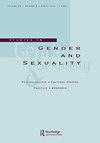Trick Mirrors: The Shape-Shifting of White CIS-Women as Survivors / Perpetrators / Comrades in the Fight for Bodily Autonomy
Q3 Social Sciences
引用次数: 0
Abstract
ABSTRACT The editor of this special issue, focused on the sequelae of the Dobbs decision, first offers an imaginative and embodied exploration of a dream that served as an organizing theory and call to action for the issue itself. The paper explores the author’s whiteness as it relates to her own body’s trauma and her work to understand instances of sexual violence through lenses of systemic oppression; the author links the way cis white women are variable allies in the fight for bodily autonomy, noting that the specific ways cis white women take up space regarding sexual assault, as well as abortion, crowd out out voices of those who experience more direct and intersectional violence. This reflection and accountability have largely shaped her commitment to seeing psychoanalysis decouple from coloniality and embrace its revolutionary roots, working to help folks locate pathology in systemic oppression and organizing macrosystems, as opposed to individuals. The paper challenges readers to resist the seductiveness of thinking about the Dobbs decision as impacting “women,” vaguely, and instead to think about those specifically gendered, racialized, disabled, queer, fat, and foreign bodies that will be most impacted by the violence and implied potential breadth of Dobbs.恶作剧镜:独联体白人女性在争取身体自主权的斗争中作为幸存者/罪犯/战友的形象转变
摘要本期特刊的编辑聚焦于多布斯决定的后遗症,首先对一个梦想进行了富有想象力和具体化的探索,作为一种组织理论,并呼吁对问题本身采取行动。这篇论文探讨了作者的白人身份,因为这与她自己身体的创伤有关,以及她通过系统压迫的视角理解性暴力事件的工作;作者将独联体白人女性在争取身体自主权的斗争中成为可变盟友的方式联系起来,指出独联体白人妇女在性侵和堕胎方面占据空间的具体方式,排挤了那些经历过更直接和交叉暴力的人的声音。这种反思和责任感在很大程度上塑造了她看到精神分析与殖民主义脱钩并拥抱其革命根源的承诺,致力于帮助人们在系统压迫中定位病理学,并组织宏观系统,而不是个人。这篇论文要求读者抵制将多布斯的决定模糊地视为对“女性”的影响的诱惑,而是思考那些受暴力影响最大的性别、种族化、残疾、酷儿、肥胖和异物,以及多布斯潜在的广度。
本文章由计算机程序翻译,如有差异,请以英文原文为准。
求助全文
约1分钟内获得全文
求助全文
来源期刊

Studies in Gender and Sexuality
Social Sciences-Gender Studies
CiteScore
0.80
自引率
0.00%
发文量
15
期刊介绍:
Beginning in the final two decades of the 20th century, the study of gender and sexuality has been revived from a variety of directions: the traditions of feminist scholarship, postclassical and postmodern psychoanalytic theory, developmental research, and cultural studies have all contributed to renewed fascination with those powerfully formative aspects of subjectivity that fall within the rubric of "gender" and "sexuality." Clinicians, for their part, have returned to gender and sexuality with heightened sensitivity to the role of these constructs in the treatment situation, including the richly variegated ways in which assumptions about gender and sexuality enter into our understandings of "normality" and "pathology."
 求助内容:
求助内容: 应助结果提醒方式:
应助结果提醒方式:


